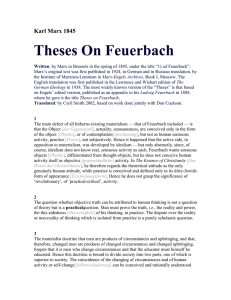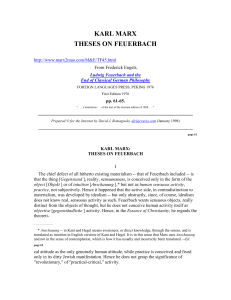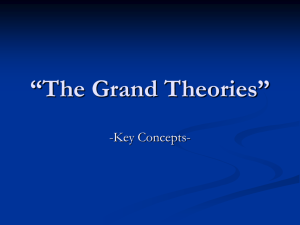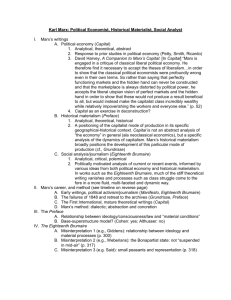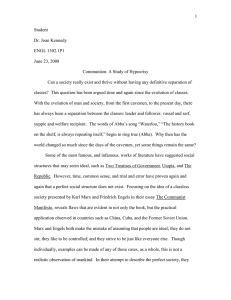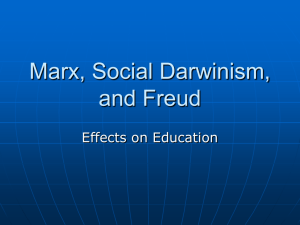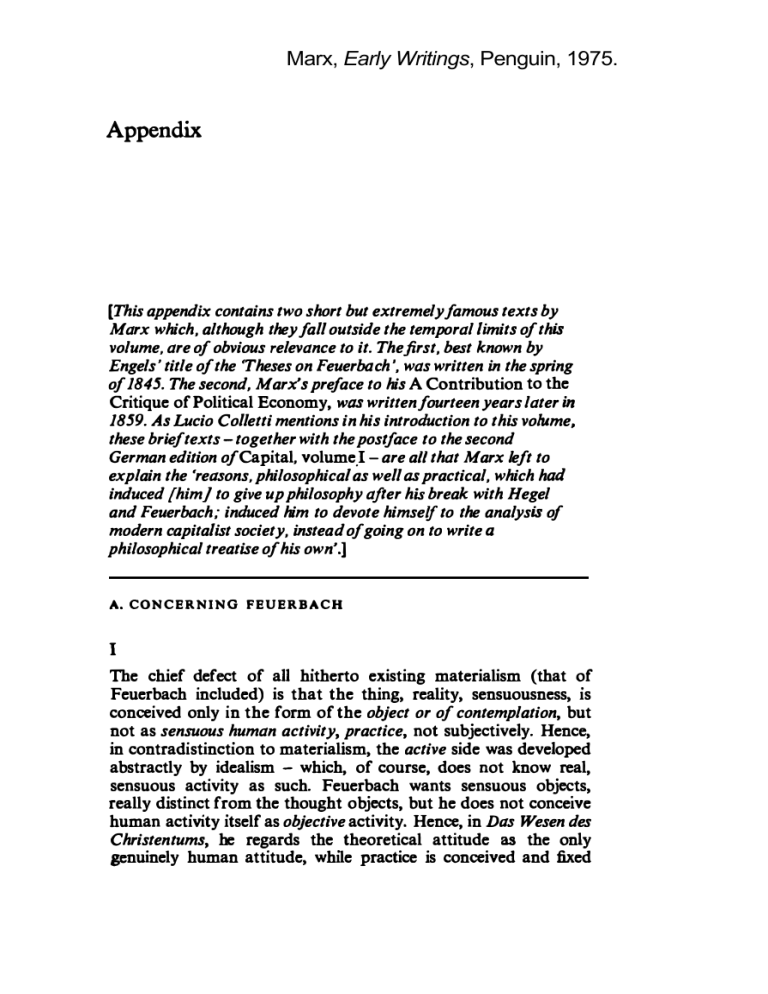
Marx, Early Writings, Penguin, 1975.
Appendix
[This appendix contains two short but extremelyfamous texts by
Marx which, although they fall outside the temporal limits of this
volume, are of obvious relevance to it. Thefirst, best known by
Engels ' title ofthe 'Theses on Feuerbach ', was written in the spring
of 1845. The second, Marx's preface to his A Contribution to the
Critique of Political Economy, WQS writtenfourteen years later in
1859. As Lucio Colletti mentions in his introduction to this volume,
these brieftexts - together with the postface to the second
German edition ofCapital, volume.I are ail that Marx left to
explain the 'reosons, philosophical as well as practical, which had
induced [him] to give up philosophy after his break with Hegel
and Feuerbach; induced him to devote himself to the analysis of
modern capitalist society, instead ofgoing on to write a
philosophical treatise ofhis own'.]
-
A. CON C E R N I N G F E U E R B A C H
1
The chief defect of a11 hitherto existing materialism (that of
Feuerbach inc1uded) is that the thing, reality, sensuousness, is
conceived only in the form of the object or of contemplation, but
not as sensuous human activity, practice, not subjectively. Hence,
in contradistinction to materialism, the active side was developed
abstractly by idealism - which, of course, does not know real,
sensuous activity as such. Feuerbach wants sensuous objects,
really distinct from the thought objects, but he does not conceive
human activity itself as objective activity. Hence, in Dos Wesen des
Christentums, he regards the theoretical attitude as the only
genuinely human attitude, while practice is conceived and fixed
422 Early Writings
only in its dirty-judaical manifestation. Hence he does not grasp
the significance of ' revolutionary'. of ' practical-critical '. activity.
Il
The question whether objective truth can be attributed t o human
thinking is not a question of theory but is a practical question.
Man must prove the truth, i.e. the reality and power, the this­
sidedness of bis thinking in practice. The dispute over the reality
or non-reality of thinking that is isolated from practice is a purely
scholastic question.
III
The materialist doctrine concerning the changing o f circum­
stances and upbringing forgets that circumstances are changed by
men and that it is essential to educate the educator himself. This
doctrine must, therefore, divide society ioto two parts, one of
which is superior to society.
The coincidence of the changing of circumstances and of
human activity or self-changing can be conceived and rationally
understood only as revolutionary practice.
IV
Feuerbach starts out from the fact o f religious self-alienation, of
the duplication of the world into a religious worId and a secular
one. His work consists in resolving the religious worId into its
secular basis. But that the secular basis detaches itself from itself
and establishes itself as an independent realm in the clouds can
ooly be explained by the cleavages and self-contradictions within
this secular basis. The latter must, therefore, in itself be both
understood in its contradiction and revolutionized in practice.
Thus, for instance, after the earthly family is discovered to be the
secret of the holy family, the former must then itself be destroyed
in theory and in practice.
V
Feuerbach, not satisfied with abstract rhinking, wants contempla­
tion ; but he does not conceive sensuousness as practical, human­
sensous activity.
Appendix 423
VI
Feuerbach resolves the religious essence into the human essence.
But the human essence is no abstraction inherent in each single
individual. In its reality it is the ensemble of the social relations.
Feuerbach, who does not enter upon a criticism of this real
essence, is consequently compelled :
l . To abstract from the historical process and to fix the re­
ligious sentiment as something by itself and to presuppose an
abstract isolated human individual.
2. Essence, therefore, can he comprehended only as ' genus ', as
an internai, dumb generality which naturally unites the Many
individuals.
-
-
VII
Feuerbach, consequently, does oot see that the ' religious senti­
ment' is itself a social product, and that the abstract individual
whom he analyses helongs to a particular forro of society.
VIII
Ali social life i s essentially practical. Ali mysteries which lead
theory to mysticism find their rafionàI solution in human practice
and in the comprehension of this practice.
IX
The highest point reached b y contemplative materialism, that is,
materialism which does not comprehend sensuousness as practical
activity, is the contemplation of single individuals and of civil
society.
X
The standpoint of the old materialism is civil society; the stand­
point of the new is human society, or social humanity.
XI
The philosophers have only interpreted the world, in various
ways ; the point is to change it.
424
Early Writings
B. P R E F A C E
(to A Contribution to the Critique ofPolitical Economy)
1 examine the system of bourgeois economy in the following
order : capital, landed property, wage-labour; the State, foreign
trade, world market. The economic conditions of existence of the
three great classes into which modem bourgeois society is
divided are analysed under the first three headings ; the inter­
connection of the other three headings is self-evident. The tirst
part of the fust book, dealing with Capital, comprises the follow­
ing chapters : 1 . The commodity; 2. Money or simple circulation ;
3. Capital in general. The present part consists of the tirst two
chapters. The entire material lies before me in the form of mono­
graphs, which were written not for publication but for self­
clarification at widely separated periods ; their remoulding into
an integrated whole according to the plan 1 have indicated will
depend upon circumstances.
A general introduction,1 which 1 had drafted, is omitted, since
on further consideration it seems to me confusing to anticipate
results which still have to he substantiated, and the reader who
really wishes to follow me will have to decide to advance from the
particular to the general. A few brief remarks regarding the course
of my study of politica1 economy may, however, he appropriate
here.
Although 1 studied jurisprudence, . 1 pursued it as a subject
subordinated to philosophy and history. In the year 1 842-3, as
editor of the Rheinische Zeitung, 1 first found myself in the em­
barrassing position of having to discuss what is knowp as
material interests. The deliberations of the Rhenish Landtag on
forest thefts and the division of landed property; the official
polemic started by Herr von Schaper, then Oberprâsident of the
Rhine Province, against the Rheinische Zeitung about the con­
dition of the Moselle peasantry, and finally the debates on free
trade and protective tariffs caused me in the first instance to tum
my attention to economic questions. On the other hand, at that
time when good intentions ' to push forward ' often took the
place of factual knowledge, an echo of French socialism and
communism, slightly tinged by philosophy, was noticeable in the
Rheinische Zeitung. 1 objected to this dilettantism, but at the
Marx Library, 1973,
1 . ' 1 857 Introduction', in Grundrlsse, The Pelican
.
pp . 8I -l l l .
Appendix 425
same time frankly admitted in a controversy with the Allgemeine
Augsburger Zeitung that my previous studies did not allow me to
express any opinion on the content of the French theories. When
the publishers of the Rheinische Zeitung conceived the illusion
that bya more compliant policy on the part of the paper itmight he
possible to secure the abrogation of the death sentence passed
upon it, 1 eagerly grasped the opportunity to withdraw from the
public stage to my study.
The first work which 1 undertook to dispel the doubts assailing
me was a critical re·examination of the Hegelian philosophy of
law; the introduction to this work being published in the Deutsch­
Franzosische Jahrbücher issued in Paris in 1 844. My inquiry led
me to the conclusion that neither legal relations nor political
forms could he comprehended whether by themselves or on the
basis of a s�lIed general development of the human mind, but
that on the contrary they originate in the material conditions of
Iife, the totality of which Hegel, following the example of English
and French thinkers of the eighteenth century, embraces within
the term ' civil society' ; that the anatomy of this civil society,
however, has to he sought in political economy. The study of this,
which 1 began in Paris, 1 continued in Brussels, where 1 moved
owing to an expulsion order issued by M. Guizot. The general
conclusion at which 1 arrived and which, once reached, became
the guiding principle of my studies cao he summarized as follows.
In the social production of their existence, men inevitably enter
into definite relations, which are independent of their will, namely
relations of production appropriate to a given stage in the develop.
ment of their material forces of production. The totality of these
relations of production constitutes the economic structure of
society, the reaI foundation, on which arises a legal and political
superstructure and to which correspond definite forms of social
consciousness. The mode of production of material life conditions
the general process of social, political and intellectual life. It is
not the consciousness of men that determines their existence, but
their social éxistence that determines their consciousness. At a
certain stage of development, the material productive forces of
society come into con1lict with the existing relations of production
or - this merely expresses the same thing in legal terms - with the
property relations within the framework of which they have
operated hitherto. From forms of development of the productive
forces these relations turn into their fetters. Then hegins an era of
426 Early Writings
social revolution. The changes in the economic foundation lead
sooner or later to the transformation of the whole immense
superstructure. In studying such transformations it is always
necessary to distinguish between the material transformation of
the economic conditions of production, which can be determined
with the precision of natural science, and the legal, political,
religious, artistic or philosophic - in short, ideological forros in
which men become conscious of this conftict and fight it out.
Just as one does not judge an individual by what he thinks about
himself, so one cannot judge such a period of transformation by
its consciousness, but, on the contrary, this consciousness must
be explained from the contradictions of material life, from the
conflict existing between the social forces of production and the
relations of production. No social order is ever destroyed before
al! the productive forces for which it is sufficient have been de­
veloped, and new superior relations of production never replace
older. ones before the material conditions for their existence have
matured within the framework of the old society. Mankind thus
inevitably sets itself only such tasks as it is able to solve, since
closer examination will always show that the problem itself arises
only when the material conditions for its solution are already
present or at least in the course of formation. In broad outline,
the Asiatic, ancient, feudal and modem bourgeois modes of
production may be designated as epochs marking progress in the
economic development of society. The bourgeois mode of pro­
duction is the last antagonistic form of the social process of
production - antagonistic not in the sense of individual antag­
onism but of an antagonism that emanates from the individuals'
social conditions of existence - but the productive forces develop­
ing within bourgeois society create also the material conditions
for a solution of this antagonism. The prehistory of human society
accordingly closes with this social formation.
Frederick Engels, with whom 1 maintained a constant exchange
of ideas by correspondence since the publication of his brilliant
essay on the critique of economic categories2 (printed in the
Deutsch-Franzosische Jahrbücher), arrived by another road
(compare his Lage der arbeitenden Klasse in EnglantP) at the same
2. ' Outlines of a Critique of Politica.l Economy'. (For this and following
footnote references, sec 'Chronology of Works by Marit and Engels' (pp.
439-42 below) for details of editions in English).
3. 'The Condition of the Working Class in England'.
.A.ppendix 427
result as l, and when in the spring of 1 845 he too came to live in
B russels, we decided to set forth together our conception as
opposed to the ideological one of German philosophy, in fact to
settle accounts with our former philosophica1 conscience. The
intention was carried out in the form of a critique of post- ­
Hegelian philosophy.4 The manuscript, two large octavo volumes,
had long ago reached the publishers in Westphalia when we were
informed that owing to changed circumstances it could not be
printed. We abandoned the manuscript to the gnawing criticism
of the mice all the more willingly since we had achieved our main
purpose - self-clarification. Of the scattered works in which at that
time we presented one or another aspect of our views to the
public, 1 shall mention only the Manifesto of the Communist
Party, jointly written by Engels and myself, and a Discours sur le
libre échange, which 1 myself published. The salient points of our
conception were first outlined in an academic, although polemical,
form in my Misère de la philosophie . . . 5 this book which was
aimed at Proudhon appeared in 1 847. The publication of an essay
on Wage-Labour6 written in German in which 1 combined the
lectures 1 had held on this subject at the German Workers'
Association in Brussels, was interrupted by the February Revolu­
tion and my forcible removal from Belgium in consequence.
The publication of the Neue Rheinische Zeitung in 1 848 and
1 849 and subsequent events cut sho�t my economic studies, which
1 could only resume in London in 1 850. The enormous amount of
material relating to the history of political economy assembled in
the British Muse\!.Dl, the fact that London is a convenient vantagc­
point for the observation of bourgeois society, and finally the new
stage of development whicb this society scemed to have entered
with the discovery of gold in California and Australia, induced
me to start again from the very beginning and to work carefully
through the new material. These studies led partly of their own
accord to apparently quite remote subjects on which 1 had to
spend a certain amount of time. But it was in particular the im­
perative ncccssity of eaming my living which reduced the time at
my disposai. My collaboration, continued now for eight ycars,
with the New York Tribune, the leading Anglo-American news­
paper, necessitated an excessive fragmentation of my studies, for
1 wrote only exceptionally newspaper correspondence in the strict
4. The GermLUI Ideolog)'.
6. 'Wage-Labour and Capital'.
S. The Povert)' 01 Philosoph)'.
428 Eorly Writings
sense. 8ince a considerable part of my contributions consisted of
articles dcaling with important economic events in Britain and on
the Continent, 1 was compeUed to become conversant with
practical details which, strictly speaking, lie outside the sphere of
political economy.
This sketch ofthe course ofmy studies in the domain ofpolitical
economy is intended merely to show that my views - no matter
how they may he judged and how little they conform to the
interested prejudices of the ruling classes - are the outcome of
conscientious research carried on over many years. At . the en­
trance to science, as at the entrance to heU, the demand must he
made :
Qui si convien lasciare ogni sospetto
Ogni vi/tà convien che qui sia morta. 7
London, January 1 859
KmI Marx
7. Dante, Divina Commedia, Canto III, lines 14-15. ('Here ail distrust must
be abandoned; here ail cowardice must die.')
